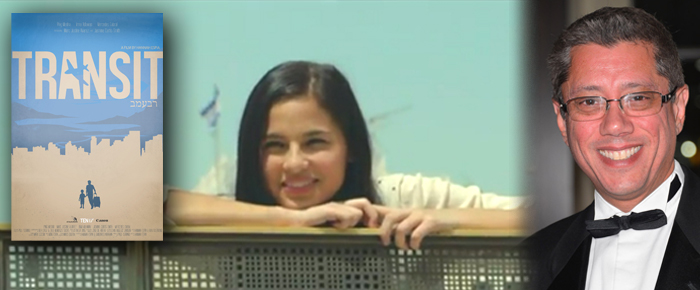
By Heidi Simmons
How does a little story about Filipino immigrants in Israel grab the attention of the man behind the action blockbusters Stargate, Independence Day, Godzilla and Patriot?
For writer and producer Dean Devlin it was the beautifully photographed and expertly told Transit by first-time filmmaker Hannah Espia. “The movie floored me,” said Devlin. “I have not talked to a single person who hasn’t been moved by this film. I can’t say that about any other film I’ve been involved with.”
When Transit first came to Devlin’s attention, he couldn’t imagine that the film from the Philipines could be well-made. He had no interest in seeing it and only watched Transit as a courtesy. “I have seen the movie seven times now and am still moved to tears,” said Devlin.
Transit tells the story of an extended family of Filipinos working and living in Tel Aviv who struggle to keep their jobs and family together under strict Israeli immigration policy and a new law that deports children back to their parents’ country of origin.
The film unfolds Rashomon style revealing the differing perspective and dilemma of each character: a mother and her teen-aged daughter, a father and his four-year-old son and a young woman seeking work. All have come to adopt Israel as their home.
“Filipinos are all over the world,” said Espia. “I wanted a Filipino story to be told in Hebrew. It makes such an impact for something so familiar to be told in another language. I needed to tell the story because we call them “OFWs” Overseas Filipino Workers. We do this without knowing the battles that they fight. They have become heroes.”
The narrative of Transit is familiar: Immigrants seeking a better life, move to another country, integrate, get married and have children who grow up in a culture and place different than their parents. Raised and educated in the country, the children assimilate and often become indifferent to the culture of their parents. They know no other home.
“It is a universal story. This could be about immigrants in any country,” said Devlin. “When we talk about immigration in this country, we can get bogged down in the specifics. But when you watch a movie like this, suddenly we can talk about it with a very empathetic point of view. It’s really about what it means to be in another country you love, but not being fully embraced.”
A 2012 film school graduate of the University of the Philippines, writer, director and editor, Espia is only 26 years old. Flying home from Israel, she experienced a scene similar to what is in the movie: A man was flying home with his young son after being deported. She pitched the story to producer Paul Soriano who knew instantly he wanted to make the film.
“A female, first-time director right out of film school, I knew would be a risk,” said Soriano. “There are Filipinos in the movie speaking fluent Hebrew. The idea of shooting in Israel always fascinated me.”
One year after meeting Espia, Transit was shooting in Tel Aviv. “We had the full support of Israel,” said producer Soriano. “They love the movie and have completely embraced it. They see a different perspective of their country.”
A writer director himself, Soriano made Transit for eight million pesos or $180,000. They shot the film in nine days with a crew of only 12. The cast consisted of eight. Espia used four cameras at a time that included the Canon T100 and a backup Canon 5B. “The crew was so small everyone was doing multiple jobs,” said Espia.
This is Transit’s third Festival. It has won nine awards in other festivals including: Best Film, Best Director, Best Actress and the Audience Award. When Devlin came on board he knew the challenge was to get people to see it. “I’m half Filipino and Jewish. Besides the two aspects of my heritage, this is a film about a moment in time. Everything this film talks about is a microcosm of what’s happening around cities. Even here in Palm Springs,” said Devlin.
Perhaps the most exciting aspect of Transit for Devlin is the creative talent coming out of the Philippines. While the title works to tell the story about the characters, Devlin believes it is also a perfect description of what is happening in the Philippines.
“I think the Philippines is in a state of transition and they are communicating now in a way they were never able to before,” said Devlin. “It is a much more sophisticated and international manner. These filmmakers represent this new wave. I think we are about to see an explosion from the Filipino art community. It’s in a moment of great transition.”
As a producer of big budget, commercial films, Devlin knows that Hollywood reacts to commerce and in that regard a movie like Transit will have little impact. But Devlin believes where it will have enormous impact is on filmmakers who are producing that commerce. “These are the films that will inspire them, give them new prospective and teach them,” said Devlin.
Films like Transit are what make the PSIFF such a wonderful experience. It gives the viewer a window into a different world while giving us an opportunity to see our selves in other cultures. For Devlin, getting behind Transit all comes down to passion. He believes when the filmmaker has passion, like Espia and Soriano, that passion becomes infectious and the audience responds. Devlin would like to see that passion in all films.
“This movie insists you look at it through everyone’s point of view. At the end, you see many more colors. You realize life is more complex and interesting than from any one vantage point,” said Devlin. “When people see this film, they walk away enriched, entertained and moved.”












































